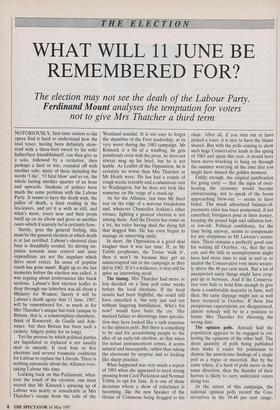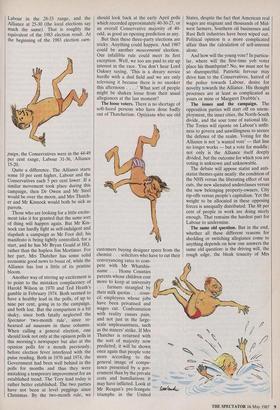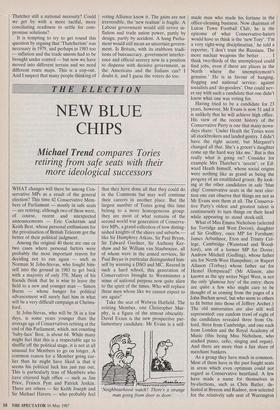THE ELECTION
WHAT WILL 11 JUNE BE REMEMBERED FOR?
The election may not see the death of the Labour Party.
Ferdinand Mount analyses the temptation for voters
not to give Mrs Thatcher a third term
NOTORIOUSLY, first-time visitors to the opera find it hard to understand how the lead tenor, having been definitely skew- ered with a three-foot sword by his wife/ father/best friend/himself, can then give us a solo, followed by a recitative, then perhaps a duet or trio, rounded off with another solo, many of these including the words 'I die', '0 fatal blow' and so on, the whole lasting another quarter of an hour and upwards. Students of politics have much the same problem with the Labour Party. It seems to have the death wish, the pallor of death, a fatal reading in the tea-leaves, and yet it is with us still, and what's more, every now and then props itself up on its elbow and gives us another canto which if scarcely bel is certainly forte.
Surely, goes the general feeling, this must be the general election at which death is at last certified. Labour's electoral class base is dreadfully eroded. Its driving im- pulses towards state control and state expenditure are not the impulses which drive most voters. Its sense of popular touch has gone numb. Right up to the last moments before the election was called, it was arguing about irrelevancies like black sections. Labour's first election leaflet to drop through our letterbox was all about a Ministry for Women. Surely it will be Labour's death agony that 11 June, 1987, will be remembered for, as much as for Mrs Thatcher's unique hat-trick (unique to Britain, that is, a commonplace elsewhere, think of Roosevelt, de Gaulle and Ade- nauer, but then Britain has been such a rackety, fidgety polity for so long).
Yet the process by which political parties are liquidated or replaced is not usually neat or smooth. It took four or five elections and several traumatic coalitions for Labour to replace the Liberals. There is nothing automatic about the Alliance over- taking Labour this time.
Looking back on this Parliament, what- ever the result of the election, one must record that Mr Kinnock's sprucing up of Labour was nearly as remarkable as Mrs Thatcher's escape from the toils of the Westland scandal. It is too easy to forget the shambles of the Foot leadership, at its very worst during the 1983 campaign. Mr Kinnock is a bit of a windbag, he gets pointlessly cross with the press, he does not always mug up his brief, but he is not feeble. As Leader of the Opposition, he is certainly no worse than Mrs Thatcher or Mr Heath were. He has had a couple of rough weeks recently and a calamitous visit to Washington, but he does not look like someone on the verge of a crack-up.
As for the Alliance, last time Mr Steel was on the edge of a nervous breakdown and, whatever Chancellor Jenkins's other virtues, fighting a general election is not among them. And the Doctor has come on a lot, his voice having shed the dying fall that dogged him. He has even begun to manage an unnerving smile.
In short, the Opposition is a good deal tougher than it was last time. If, as Mr Tebbit prophesies, the Tories 'walk it', then it won't be because they get an uninterrupted run in the campaign as they did in 1983. If it's a walkover, it may still be quite an interesting stroll.
The timing. Mrs Thatcher had more or less decided on a June poll some weeks before the local elections. If the local results had been frightful, she could still have cancelled it, but only just and not without lingering humiliation. Who's fit now? would have been the cry. Her marked failure to discourage June specula- tion may have looked like a rash response to the opinion polls. But there is something to be said for accustoming people to the idea of an early-ish election, so that when the actual announcement comes, it seems natural and inescapable, rather than taking the electorate by surprise and so looking like sharp practice.
What happened was very much a repeat of 1983 when she appeared to need strong pressing from Cecil Parkinson and Norman Tebbit to opt for June. It is one of those decisions where a show of reluctance is becoming, like the new Speaker of the House of Commons being dragged to his chair. After all, if you turn out to have picked a loser, it is nice to have the blame shared. But with the polls coming to show such huge Conservative leads in the spring of 1983 and again this year, it would have been nerve-wracking to hang on through the summer worrying all the time that you might have missed the golden moment.
Oddly enough, the original justification for going early — that the signs of over- heating the economy would become embarrassing, not to speak of the boom approaching blow-out — seems to have faded. The much advertised balance-of- payments crisis has been postponed, if not cancelled; foreigners pour in their money, keeping the pound high and inflation low, or low-ish. Political confidence, for the time being anyway, seems to compensate for any sloppiness in Mr Lawson's econo- mics. There remains a perfectly good case for waiting till October, viz, that the tax cuts and the falls in unemployment might have had more time to sink in and so to anchor the Conservative vote more secure- ly above the 40 per cent mark. But a lot of unexpected nasty things might have crop- ped up in between. And if the Conserva- tive vote fails to hold firm enough to give them a comfortable majority in June, well then, the same slippage might just as well have occurred in October. If these fine prosperous expectations are disappointed, almost nobody will be in a position to blame Mrs Thatcher for choosing the wrong date.
The opinion polls. Already half the population appears to be engaged in col- lecting the opinions of the other half. The sheer quantity of polls being published does make it easier for politicians to dismiss the unwelcome findings of a single poll as a rogue or maverick. But by the same token, if a herd of polls move in the same direction, then the thunder of their hooves is likely to carry undecided voters along too.
At the outset of this campaign, the national opinion polls record the Con- servatives in the 39-44 per cent range, Labour in the 28-33 range, and the Alliance at 25-30 (the local elections say much the same) . That is roughly the equivalent of the 1983 election result. At the beginning of the 1983 election cam- paign, the Conservatives were in the 44-49 per cent range, Labour 31-36, Alliance 15-20.
Quite a difference. The Alliance starts some 10 per cent higher, Labour and the Conservatives each 5 per cent lower. If a similar movement took place during this campaign, then Dr Owen and Mr Steel would be over the moon, and Mrs Thatch- er and Mr Kinnock would both be sick as parrots.
Those who are looking for a little excite- ment take it for granted that the same sort of thing will happen again. But Mr Kin- nock can hardly fight as self-indulgent and slapdash a campaign as Mr Foot did; his manifesto is being tightly controlled, for a start, and he has Mr Bryan Gould at HQ, rather than the hapless Jim Mortimer. For her part, Mrs Thatcher has some solid economic good news to boast of, while the Alliance has lost a little of its pristine bloom.
Another way of stirring up excitement is to point to the mistaken complacency of Harold Wilson in 1970 and Ted Heath's gamble in February 1974. Both seemed to have a healthy lead in the polls, of up to nine per cent, going in to the campaign, and both lost. But the comparison is a bit shaky, since both fatally neglected the Spectator 'two-month rule', since re- hearsed ad nauseam in these columns. When calling a general election, one should look not only at the opinion polls in this morning's newspaper but also at the opinion polls for a month previously, before election fever interfered with the pulse reading. Both in 1970 and 1974, the Government had been well behind in the polls for months and thus they were mistaking a temporary improvement for an established trend. The Tory lead today is rather better established. The two parties have not been at level peggings since Christmas. By the two-month rule, we should look back at the early April polls which recorded approximately 40-30-27, or an overall Conservative majority of 40- odd, as good an opening prediction as any.
But then these three-party elections are tricky. Anything could happen. And 1987 could be another mouvementh election. Our infallible rule could meet its first exception. Well, we too are paid to stir up interest in the race. You don't hear Lord Oaksey saying, 'This is a dreary novice hurdle with a dud field and we are only televising it because there is no snooker this afternoon , . .' What sort of people might be shaken loose from their usual allegiances at the last moment?
The loose voters. There is no shortage of soft-faced persons who have done badly out of Thatcherism. Opticians who see old customers buying designer specs from the chemist . . solicitors who have to cut their conveyancing rates to com- pete with Mr Whatshis- name . . Home Counties parents whose children cost more to keep at university . . . farmers strangled by their milk quotas . . coun- cil employees whose jobs have been privatised and wages cut. Confrontation with reality causes pain, and not just in the large- scale unpleasantness, such as the miners' strike. If Mrs Thatcher is returned with the sort of majority now predicted, it will be shown once again that people vote more according to the general image of compe- tence presented by a gov- ernment than by the private costs and humiliations it may have inflicted. Look at Mr Reagan's pre-Irangate triumphs in the United States, despite the fact that American real wages are stagnant and thousands of Mid- west farmers, Southern oil businesses and Rust Belt industries have been wiped out. Political opinion is a more complicated affair than the calculation of self-interest alone.
And how will the young vote? In particu- lar, where will the first-time yob voter place his thumbprint? No, we must not be so disrespectful. Patriotic fervour may drive him to the Conservatives, hatred of the police towards Labour, desire for novelty towards the Alliance. His thought processes are at least as complicated as yours or mine or Margaret Drabble's.
The issues and the campaign. The opposition parties will start off on unem- ployment, the inner cities, the North-South divide, and the sour tone of national life. The Tories will riposte on Labour's unfit- ness to govern and unwillingness to secure the defence of the realm. Voting for the Alliance is not 'a wasted vote' — that line no longer works — but a vote for muddle; not only is the Alliance itself deeply divided, but the outcome for which you are voting is unknown and unknowable.
The debate will appose statist and anti- statist themes quite neatly: the condition of the NHS versus the liberating effect of tax cuts, the new alienated underclasses versus the new belonging property-owners, City rip-offs versus people's capitalism. Yet the weight to be allocated in these opposing forces is unequally distributed. The 88 per cent of people in work are doing nicely enough. That remains the hardest part for Labour to undermine.
The same old question. But in the end, whether all these different reasons for shedding or switching allegiance come to anything depends on how one answers the same old question: is the driving will, the rough edge, the bleak tenacity of Mrs Thatcher still a national necessity? Could we get by with a more tactful, more conciliating readiness to settle for com- promise solutions?
It is tempting to try to get round this question by arguing that `Thatcherism' was necessary in 1979, and perhaps in 1983 too — inflation and the trade unions had to be brought under control — but now we have moved into different terrain and we need different route maps. This is a cop-out. And I suspect that many people thinking of voting Alliance know it. The gains are not irreversible, the 'new realism' is fragile. A Labour government would still revive in- flation and trade union power, partly by design, partly by accident. A hung Parlia- ment would still mean an uncertain govern- ment. Is Britain, with its stubborn tradi- tions of bureaucracy, government interfer- ence and official secrecy now in a position to dispense with decisive government, as the Americans and the Italians can? I doubt it, and I guess the voters do too.






















































 Previous page
Previous page